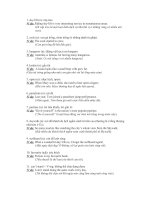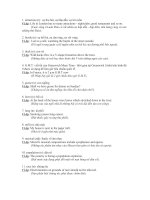learn voc
Bạn đang xem bản rút gọn của tài liệu. Xem và tải ngay bản đầy đủ của tài liệu tại đây (40.71 KB, 2 trang )
<span class='text_page_counter'>(1)</span><div class='page_container' data-page=1>
English is a very flexible language and you can build on your vocabulary and learn how to make
new words.
One way of doing this is to add prefixes (such as dis, pre or co) before the word.
Here's a list of common prefixes with their meanings and some examples.
<b>anti (= against)</b>
antibodies, anti-social
<b>auto (self)</b>
autonomous, autobiography, automobile
<b>bi (= two)</b>
bicycle
<b>co (= with)</b>
cooperate, coordinate
<b>contra (= against)</b>
contradict, contravene
<b>de (= remove)</b>
deregulate, deselect
<b>dis (= not)</b>
disappear
<b>il (= not)</b>
illegal
<b>im (= not)</b>
immaterial, immature
<b>inter (= between)</b>
international
<b>mis(= badly/wrongly)</b>
misinform, misbehave, misunderstand
<b>multi (= many)</b>
multinational
<b>non (= opposite)</b>
non-profit
</div>
<span class='text_page_counter'>(2)</span><div class='page_container' data-page=2>
<b>over (= too much)</b>
oversleep, overwork
<b>post (= after)</b>
postpone, postnatal
<b>pre (= before)</b>
predict
<b>re (= again)</b>
rewrite, relive
<b>sub (= under)</b>
submarine
<b>super (= higher/improved)</b>
supermarket
<b>trans (= across)</b>
transatlantic
<b>uni (= one)</b>
uniform
</div>
<!--links-->









